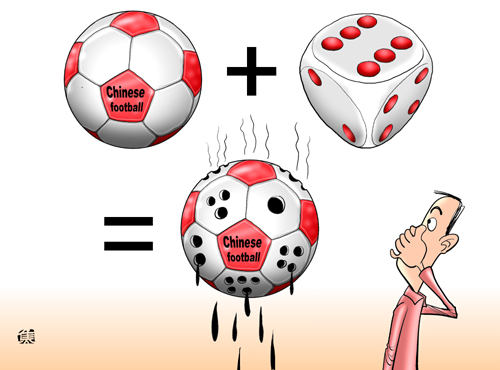Eradicating cancer in Chinese sports
As China is moving toward a market economy, the country is being driven more and more by money. By no means is a market economy undesirable, but if a society is largely motivated by money, it is not going to succeed.
Lately, the Chinese sports world has been watching the investigations going on in the Chinese soccer league. It seems that a number of club leaders and their soccer players have been questioned and even detained. Many sports fans expect that some of them will eventually be proven guilty.
 |
| The rotten heart of Chinese soccer. [By Jiao Haiyang/china.org.cn] |
The whole chain reaction has even extended to the current head coach of the Chinese national team, Gao Hongbo. Gao's former assistant at Xiamen, You Kewei, has been arrested for match-fixing. It is hard to believe that an assistant could bet his team without the head coach knowing. In the meantime, Chair of China's National Soccer Association Yuan Weimin has been openly challenged for his accountability of the entire scandal.
Over the years, the life of China's soccer industry has been questionable. Large amounts of funding have been injected into the sport, especially with the creation of a professional soccer league. Yet the sport seems to be going nowhere. National teams are losing games, soccer clubs are losing money and the stands are losing fans.
In one word, the soccer industry in China is ill. The actors are becoming stakeholders – they use soccer to bet for their fortune, involving the officials, coaches, players and fans. Behind them are the tycoons of the gambling machine. Meanwhile, the National Soccer Association, the top agency to administer the league, has been silent when facing the unaccountable game play.
It is no secret that China's soccer industry is seriously infected with the virus of match-fixing and gambling. This is not a unique case, as this also happens in other countries and possibly in other Chinese sports industries as well. But the multibillion-yuan gambling business of soccer possibly dwarfs the gambling that goes on in other sports. It completely twists the spirit of fair play.
Such a state of affairs reflects the ill-orientation of people toward money. As China is a socialist country, its people need to be better educated to maintain morality and observe the law. Though the education level in the country has indeed risen – in Shanghai nearly 80 percent of high school graduates are admitted into universities now – more and more people are now gambling and do not view it as unethical or as a violation of the rule of law.
Some people argue that gambling has a rationale, as it taps an individual's wisdom and/or luck. Just as people buy shares and bet their luck on the stock exchange, they draw on their knowledge about the industry and from reports of share-issuing companies. Taking risks on the stock exchange used to be viewed as a practice of capitalism, as people don't do manual labor to increase their wealth. However, at the present time, such a behavior is called a "venture investment" and taking the risk is viewed as mind labor, making it legal to do stock exchange during the reform era.
Putting the legality of gambling aside, match-fixing is not permitted everywhere. All athletes shall do their utmost to keep the Olympic motto – citius, altius, fortius (faster, higher, stronger). Whether one wins or not, s/he has to observe the aforementioned spirit and defend the honor of fair play.
 0 Comments
0 Comments







Go to ForumComments